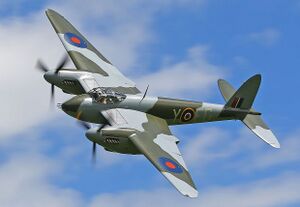Armstrong Mosquito
| Armstrong Mosquito | |
|---|---|
 A restored Mosquito flying over Shinjiku Haneda Airport for the 2015 Shinjiku Airshow | |
| General information | |
| Type | Light bomber Fighter-bomber Night fighter Maritime strike aircraft photo-reconnaissance aircraft |
| Manufacturer | Armstrong Aeronautics |
| History | |
| Manufactured | 1941-1950 |
| Introduction date | 9 August 1941 |
| Retired | 1963 |
The Armstrong Mosquito is a Lucian multi-role combat aircraft with a two-man crew. It served during and after the Great War. It was one of few operational front-line aircraft of the era constructed almost entirely of wood and was nicknamed The Wooden Wonder. The Mosquito was also known affectionately as the "Mossie" to its crews. Originally conceived as an unarmed fast bomber, the Mosquito was adapted to roles including low to medium-altitude daytime tactical bomber, high-altitude night bomber, pathfinder, day or night fighter, fighter-bomber, intruder, maritime strike aircraft, and fast photo-reconnaissance aircraft. A single passenger could ride in the aircraft's bomb bay when it was adapted for the purpose.
When Mosquito production began in 1941, it was one of the fastest operational aircraft in the world. Entering widespread service in 1942, the Mosquito was a high-speed, high-altitude photo-reconnaissance aircraft, continuing in this role throughout the war.